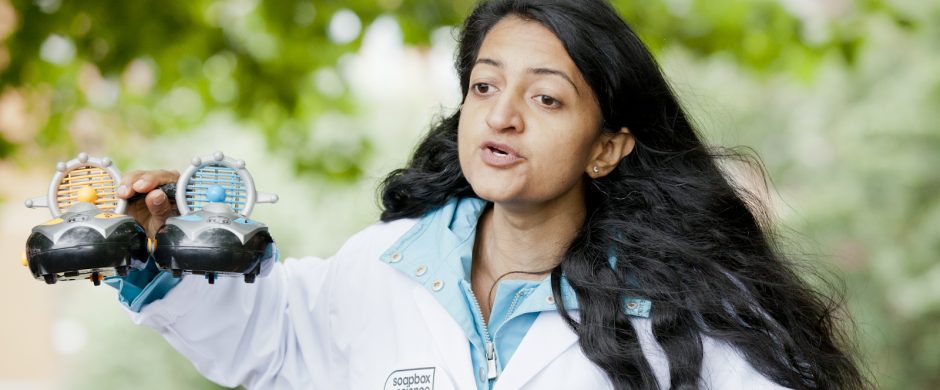 Jenny Jaffe is a Wildlife Veterinarian working at the Institute of Zoology at the Zoological Society of London (ZSL). She investigates which diseases can affect reintroductions of endangered British species of animals, from wart-biter crickets and dormice to smooth snakes and red kites. Catch Jenny on her soapbox on the 27th of May in London, where she’ll be talking about “Diseased dormice? How wildlife vets help reintroduce rare species!”
Jenny Jaffe is a Wildlife Veterinarian working at the Institute of Zoology at the Zoological Society of London (ZSL). She investigates which diseases can affect reintroductions of endangered British species of animals, from wart-biter crickets and dormice to smooth snakes and red kites. Catch Jenny on her soapbox on the 27th of May in London, where she’ll be talking about “Diseased dormice? How wildlife vets help reintroduce rare species!”
SS: How did you get to your current position?
JJ: I’m working as a research focused wildlife veterinarian at the Institute of Zoology, Zoological Society of London (ZSL). Initially I just wanted to work with primates, and all through vet school that was my plan. I Have managed to ‘live the dream’ by working with monkeys in Ecuador, orangutans in Borneo, and chimps in Sierra Leone. However, the rescue centre in Ecuador did have all kinds of wildlife and my MSc at the Royal Veterinary College/ZSL on wildlife health helped broaden my perspective. So when I decided to return to the UK after almost three years in Sierra Leone, I was fine with working on native British species. The fact that I had done my MSc at ZSL a few years before meant my current boss already knew me and was confident I could do the job.
SS: What, or who, inspired you to get a career in science?
JJ: Basically, I’m just very curious, and can imagine being happy in other non-science jobs that would satisfy that curiosity. What did help is that my father was an astronomer and my older sister an anthropologist. Though very different fields from veterinary science, their passion for research and academia did inspire me.
SS: What is the most fascinating aspect of your research/work?
 JJ: I really enjoy the occasional field trips and clinical work, handling species as diverse as crickets, smooth snakes and pool frog tadpoles. During post-mortem examinations on birds like red kites I will sometimes stumble on an unusual finding; for instance a tail docking ring for lambs in the gizzard of the bird. Apparently they like hovering over fields with lambing sheep to eat the sheep placenta and the odd lamb’s tail! However, surprisingly fascinating is also the ‘arms race’ between hosts and pathogens that I research. For instance Wolbachia bacteria can cause their insect hosts to produce only female offspring. As the bacteria are transmitted through the host’s eggs that means the bacteria will spread through a population very quickly.
JJ: I really enjoy the occasional field trips and clinical work, handling species as diverse as crickets, smooth snakes and pool frog tadpoles. During post-mortem examinations on birds like red kites I will sometimes stumble on an unusual finding; for instance a tail docking ring for lambs in the gizzard of the bird. Apparently they like hovering over fields with lambing sheep to eat the sheep placenta and the odd lamb’s tail! However, surprisingly fascinating is also the ‘arms race’ between hosts and pathogens that I research. For instance Wolbachia bacteria can cause their insect hosts to produce only female offspring. As the bacteria are transmitted through the host’s eggs that means the bacteria will spread through a population very quickly.
SS: What attracted you to Soapbox Science in the first place?
JJ: I like the challenge of making my work accessible to people who know nothing about it! I really enjoyed talking to children and adults in a similar setting during a ‘Sunset Safari’ event at London Zoo, where there were ‘Science Stations’ where we ZSL researchers could explain our research to visitors.
SS: Sum up in one word your expectations for the day
JJ: Fun!
SS: If you could change one thing about the scientific culture right now, what would it be?
JJ: More focus on getting results to policy makers and the general public, and not just in peer-reviewed journals.
SS: What would be your top recommendation to a woman studying for a PhD and considering pursuing a career in academia?
JJ: Realistically – it’s not just what you know, but who you know… Make sure you get to know people in the field you are interested in so they are at least aware of your existence and might alert you to new opportunities coming up. Knowing people in advance can also help you avoid the worst PhD supervisors or bosses which might cause you to give up on your PhD or academia altogether. I’ve seen that happen to quite a few friends!
